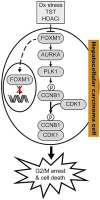当前位置:
X-MOL 学术
›
Free Radical Bio. Med.
›
论文详情
Our official English website, www.x-mol.net, welcomes your
feedback! (Note: you will need to create a separate account there.)
Sensitization to oxidative stress and G2/M cell cycle arrest by histone deacetylase inhibition in hepatocellular carcinoma cells.
Free Radical Biology and Medicine ( IF 7.1 ) Pub Date : 2019-12-20 , DOI: 10.1016/j.freeradbiomed.2019.12.021 Hae-Ahm Lee 1 , Ki-Back Chu 2 , Eun-Kyung Moon 3 , Sung Soo Kim 4 , Fu-Shi Quan 5
Free Radical Biology and Medicine ( IF 7.1 ) Pub Date : 2019-12-20 , DOI: 10.1016/j.freeradbiomed.2019.12.021 Hae-Ahm Lee 1 , Ki-Back Chu 2 , Eun-Kyung Moon 3 , Sung Soo Kim 4 , Fu-Shi Quan 5
Affiliation

|
Oxidative stress resistance in cancer cells has contributed to multi-drug resistance, which poses a serious challenge to cancer therapy. To surmount this, combinatorial treatment involving anticancer drugs and histone deacetylase inhibitors (HDACi) have emerged as a chemotherapeutic option. Yet, HDACi's role in redox states of cancer cells still requires elucidation. In the present study, we hypothesized that HDACi sensitizes cancer cells to oxidative stress and results in G2/M cell cycle arrest. Cell viability and cell cycle were analyzed using Cell Counting Kit 8 (CCK8) and fluorescent activated cell sorting (FACS), respectively. The transcriptomes of cells were investigated by massive analysis of cDNA end (MACE). Expression of mRNA and proteins were analyzed by quantitative real-time PCR (qPCR) and Western blot, respectively. Intracellular oxidative stress induced by tert-Butyl hydroperoxide (tBHP) reduced cell viability and resulted in G2/M cell cycle arrest in a dose-dependent manner in hepatocellular carcinoma (HCC) cells. The effects of sorafenib on cell cycle arrest and HCC viability were enhanced through HDACi treatment. MACE revealed that genes related to progression of G2/M cell cycle including Foxm1, Aurka, Plk1, and Ccnb1 were significantly down-regulated in tBHP and HDACi-treated HepG2 cells. Inhibition of FOXM1 with thiostrepton also resulted in reduced cell viability and expression of FOXM1 target genes such as Aurka, Plk1, and Ccnb1. These results indicate that HDACi sensitizes HepG2 cells to oxidative stress and results in G2/M cell cycle arrest via down-regulation of FOXM1, which plays a key role in progression of G2/M cell cycle.
中文翻译:

肝细胞癌细胞中组蛋白脱乙酰基酶的抑制作用对氧化应激和G2 / M细胞周期的阻滞。
癌细胞中的氧化应激抗性导致了多种药物抗性,这对癌症治疗提出了严峻的挑战。为了克服这个问题,涉及抗癌药物和组蛋白脱乙酰基酶抑制剂(HDACi)的组合治疗已成为一种化疗选择。然而,仍需要阐明HDACi在癌细胞氧化还原状态中的作用。在本研究中,我们假设HDACi使癌细胞对氧化应激敏感并导致G2 / M细胞周期停滞。分别使用Cell Counting Kit 8(CCK8)和荧光激活细胞分选(FACS)分析细胞活力和细胞周期。通过大量分析cDNA末端(MACE)来研究细胞的转录组。通过定量实时PCR(qPCR)和蛋白质印迹分别分析mRNA和蛋白质的表达。叔丁基过氧化氢(tBHP)诱导的细胞内氧化应激会降低细胞活力,并导致肝癌细胞(HCC)细胞中的G2 / M细胞周期以剂量依赖的方式停滞。索拉非尼对细胞周期停滞和HCC生存力的影响通过HDACi处理得以增强。MACE揭示了与G2 / M细胞周期进程相关的基因,包括Foxm1,Aurka,Plk1和Ccnb1,在tBHP和HDACi处理的HepG2细胞中显着下调。硫代链霉菌素对FOXM1的抑制作用还导致细胞活力降低以及FOXM1目标基因(如Aurka,Plk1和Ccnb1)的表达降低。这些结果表明,HDACi使HepG2细胞对氧化应激敏感,并通过下调FOXM1导致G2 / M细胞周期停滞,而FOXM1在G2 / M细胞周期的进程中起关键作用。
更新日期:2019-12-21
中文翻译:

肝细胞癌细胞中组蛋白脱乙酰基酶的抑制作用对氧化应激和G2 / M细胞周期的阻滞。
癌细胞中的氧化应激抗性导致了多种药物抗性,这对癌症治疗提出了严峻的挑战。为了克服这个问题,涉及抗癌药物和组蛋白脱乙酰基酶抑制剂(HDACi)的组合治疗已成为一种化疗选择。然而,仍需要阐明HDACi在癌细胞氧化还原状态中的作用。在本研究中,我们假设HDACi使癌细胞对氧化应激敏感并导致G2 / M细胞周期停滞。分别使用Cell Counting Kit 8(CCK8)和荧光激活细胞分选(FACS)分析细胞活力和细胞周期。通过大量分析cDNA末端(MACE)来研究细胞的转录组。通过定量实时PCR(qPCR)和蛋白质印迹分别分析mRNA和蛋白质的表达。叔丁基过氧化氢(tBHP)诱导的细胞内氧化应激会降低细胞活力,并导致肝癌细胞(HCC)细胞中的G2 / M细胞周期以剂量依赖的方式停滞。索拉非尼对细胞周期停滞和HCC生存力的影响通过HDACi处理得以增强。MACE揭示了与G2 / M细胞周期进程相关的基因,包括Foxm1,Aurka,Plk1和Ccnb1,在tBHP和HDACi处理的HepG2细胞中显着下调。硫代链霉菌素对FOXM1的抑制作用还导致细胞活力降低以及FOXM1目标基因(如Aurka,Plk1和Ccnb1)的表达降低。这些结果表明,HDACi使HepG2细胞对氧化应激敏感,并通过下调FOXM1导致G2 / M细胞周期停滞,而FOXM1在G2 / M细胞周期的进程中起关键作用。











































 京公网安备 11010802027423号
京公网安备 11010802027423号